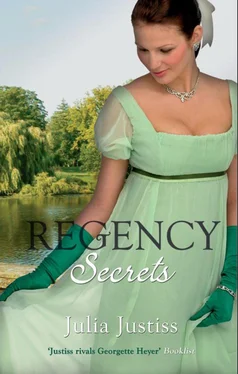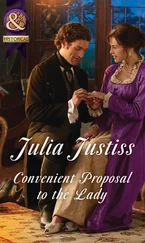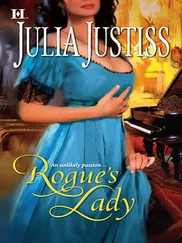Despite the distracting presence of Lady Ardith at his elbow, the squire nonetheless occasionally sent an appreciative glance toward the lady at the far end of his table. And, Beau realized with an unpleasant shock, the vicar, who sat in privileged proximity just opposite Mrs. Martin, seldom took his eyes off her.
A man of the cloth, Beau thought with an immediate surge of indignation, should not be entertaining thoughts that, to judge by the heated intensity of the vicar’s expression, were obviously both covetous and carnal.
Beau turned to find Lady Ardith staring in the direction of his gaze, her eyes frosty as they rested on Mrs. Martin. With a glittering smile, she abruptly angled her head toward the squire’s sister, who sat absently picking at her food.
“Lady Winters, you had Mrs. Martin write out your invitation cards, didn’t you? Kind of you to offer her employment, which she badly needs, I imagine.”
Belatedly realizing she’d been addressed, Lady Winters focused out of her haze. “Employed?” she repeated, looking confused. “No, I don’t pay Mrs. Martin.”
“Nay, of course not, ‘tis as a friend of the family she does it,” the squire clarified.
“Well, I knew the moment I received the invitation that someone other than dear Lady Winters had copied out the cards. I vow, one can always distinguish the hand of a true lady. My own écriture is so precise, I cannot address more than a handful of cards at a sitting. Before a ball, I must spend the veriest week at it.”
That speech evaporated whatever tepid sympathy Beau had previously summoned for the acidic blond beauty. Squelching a strong desire to deal Lady Ardith a sharp set-down, Beau forced himself to remain discreetly silent.
“Quite a pretty hand she has, we think,” the squire said with a nod toward Mrs. Martin.
“Indeed?” Lady Ardith raised penciled brows. “Mrs. Martin is fortunate you and Lady Winters are so obliging. I was quite shocked when first I heard that a woman, of supposedly gentle birth, chose to live alone without even the vestige of a chaperone. Did you not, in your good nature, continue to recognize her, I daresay she might not be received by any good family in the neighborhood.”
While Beau choked back his outraged response, Lady Ardith leaned confidentially closer to the squire. “Though you might warn her to be more discreet. Appearing in such a—well, coming—gown, and living alone as she does, who knows what sort of thoughts she might inspire in some of the local men? Even the vicar looks quite … taken. Though perhaps that’s her intent.” Lady Ardith smiled slyly. “Still, she’d best take care. Exposed as she is, a very little gossip deeming her ‘fast’ would be enough to ruin her reputation. Where would she be if the common folk no longer sought her out for their pills and potions?”
Her “confidential” advice, uttered in a tone that must have carried halfway down the table, if not all the way to the ears of the lady it derided, was the final straw. Deciding to end the conversation before he lost control and strangled Lady Ardith, Beau abruptly turned to his hostess. “Lady Winters, is it not time for you to withdraw?”
Again looking startled, Lady Winters goggled at him. After fussing to find her handkerchief and reticule, she rose. “Brother, gentlemen, if you will excuse us?”
Looking forward to the freedom of the drawing room where at last he could approach his lady, and knowing she would probably seek an excuse to leave the party early, Beau maneuvered the gentlemen out of the dining room after a single glass of brandy. Though Lord Asquith grumbled about being separated from his cigars, the rest of the men, doubtless relishing thoughts of a closer view down the bodice of his wife’s dress, greeted Beau’s suggestion with approval.
As he followed his host to the drawing room, Beau rapidly developed a plan that, with a little help from Mac, would ensure Mrs. Martin wasn’t allowed to flee before the other guests departed. Short of storming her bedchamber—and he wasn’t completely sure he’d not resort to that extremity if pressed—he was prepared to do whatever it took to get her alone.

It was, Laura decided, the nicest dinner party she’d ever attended. Despite the sparkling gown that had initially drawn her to the attention of the company, the far-moreglittering presence of Lady Ardith guaranteed that she was soon able to return to her preferred role as a quiet observer. And so, wearing a dress that made her feel like a princess, being treated with kindness and even a touch of deference by her neighbors, she could relax and with perfect propriety let her gaze stray down the table to Lord Beaulieu.
Who was without question the most impressive gentleman in the room. The midnight-black of evening dress suited his raven hair and dark eyes, and the stark simplicity of the color and cut of his garments merely emphasized his breadth of shoulder, litheness of body and aura of power. Though she could not make out his words, even at a distance she could tell how, despite the impediment of Lady Ardith, whose rapid, laughter-punctuated banter scarcely paused long enough to allow her to draw breath or consume a morsel, he skillfully handled his end of the table, managing to coax even the normally silent Lady Winters into the conversation.
Occasionally he glanced in her direction. When he caught her eye, his mouth would curve in that compelling, intimate smile, and she would again be seized with the absurd notion that despite being surrounded by a tableful of people, one of whom was an accredited beauty, he was interested in her alone.
Absurd, but on this magical night when like Cinderella she’d appeared in borrowed finery and caught the eye of a prince, she’d ignore the prosaic voice of common sense.
Giddy delight, like champagne bubbles rising, swelled in her breast, and she could not help smiling. How different this evening was from the mostly wretched dinner parties she’d attended as a shy and nervous debutante, then as an inexperienced young bride.
The smile faded. She’d come to hate social functions, knowing her hawk-eyed husband would observe her every gesture and remark, and after the guests departed subject her to a scathing critique. She was too forward or too timid; she spoke too little or too much, played cards badly, danced too frequently or too seldom.
Even after she’d stopped caring about his good opinion, realizing it impossible to obtain, she so dreaded those post-party diatribes she could scarcely eat during dinner. Especially since as Charleton seemed to sense her will to please him diminishing, over the passing months he became increasingly angry, demeaning—and violent.
An involuntary shudder passed through her. With an effort, she shook her thoughts free. She mustn’t spoil a moment of this perfectly lovely gathering—the only occasion she would ever appear outside her dull brown persona—fretting over demons who were, she reassured herself again, safely consigned to the past.
“Is something the matter? You look … disturbed.”
The vicar’s question startled her. “N-nothing!” she replied, damping down an automatic alarm. “I was woolgathering, which was terribly rude. Please excuse me.”
“No forgiveness necessary. I must simply redouble my efforts to entertain you. ‘Twould be a crushing blow to my self-esteem to know the loveliest lady in the room found my dinner conversation dull.”
She dutifully smiled at the compliment, though in truth the only mild distress she’d experienced since coming to the table was generated by rather too solicitous attention of Reverend Mr. Blackthorne. It seemed, as the courses were brought and removed in turn, that every time she glanced in his direction, she found his admiring and uncomfortably intense gaze resting on her.
Читать дальше













